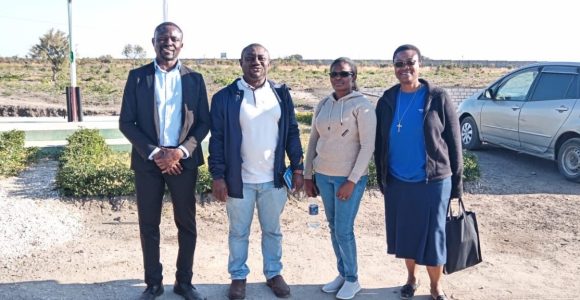
By Owen Chibambo – Collaborator, TAKUZA
Our team embarked on a mission that lies at the very heart of our work—restoring dignity, hope and human connection to those often forgotten in our society. We visited Mwembeshi Correctional Remand Facility in Mumbwa, Central Province where dozens of inmates, many of them migrants, are held for immigration related offences. The purpose of our visit was to profile—facilitate documentation for inmates who had completed their sentences. Among those we attended to were nationals from Burundi, the Democratic Republic of Congo, Uganda, Malawi, Namibia, Tanzania, South Africa and Zimbabwe.
Through careful profiling, we assess each migrant’s legal status, vulnerabilities and immediate needs, laying the groundwork for meaningful and tailored support. Once the profiling exercise is complete, the complied information is shared with the Department of Immigration to advocate their safe return home, especially after they have served their sentence or paid a fine.
Our efforts do not end there. Together with the Catholic Sisters from Talitha Kum Networks in other countries, we also take on the task of family tracing. And when families are found and willing to help, their support, sometimes financial or simply emotional, can be life-changing. A few migrants have been able to return home because of this solidarity. These stories remind us of the strength of community and the power of empathy when extended across borders.
But this work goes beyond data collection. At its core, it is about restoring human dignity. We meet people whose dreams have been derailed and now find themselves trapped—physically, emotionally and spiritually.
Disturbingly, we also encountered signs of human trafficking and migrant smuggling—young men and women exploited for cheap labour, coerced by hearsay and false promises or misled into believing that refugee status could be claimed without knowing the legal process. These are not just immigration violations; they are deep injustices that rob individuals of their agency, identity and freedom.
What struck me most was how this experience exposed the loss of dignity that many migrants endure. Their freedom of movement and association—core to their human identity—has been taken from them. Their dreams, their saving, the time invested in search of a better life, all of it crushed the moment they were arrested. Many are now confined in a foreign land with no family or friends to call upon. Some have completed their sentences yet remain in detention, held back by limited government resources or the absence of diplomatic support from their home countries. Others simply because their families cannot afford the cost of travel tickets back to their home countries.
It is in moments like these that one can feel God’s presence being distant. A life being lived in oblivion. Faith is tested, hope is a blur and trust—in institutions, the Church, even other people—seems fragile. Prison walls separate them from the outside world. All they see is the sun filtering through each morning—a quiet reminder that another day has come, and like all the others, will soon fade away.
Migration carries grave risks, especially when one is unaware of or unable to comply with immigration laws. But for many, migration is not a choice. IT’S SURVIVAL. Political instability, poverty, and persecution force people to flee, to dream of better lives elsewhere.
As Christians, we are called to respond with compassion and justice. Scripture speaks clearly:
“When a foreigner resides among you in your land, do not mistreat them. The foreigner residing among you must be treated as your native-born. Love them as yourself, for you were foreigners in Egypt.” (Leviticus 19:33–34)
And again, Jesus affirms:
“The second is this: ‘Love your neighbor as yourself.’ There is no commandment greater than these.” (Mark 12:31)
“Who is my neighbor?” the lawyer asked. Jesus replied with the parable of the Good Samaritan. (Luke 10:25–37
Empathy toward these our brothers and sisters does not make us different from them; it connects us to our shared humanity. None of us has ever lived without support from a friend, a family member or even a stranger. This is a noble call for all people to collaborate with law enforcement, CSOs, churches and communities to protect the dignity and rights of all, especially migrants.
Despite their difficult circumstances, many of the inmates are in relatively good health. The facility does provide medication, though some still suffer from skin rashes—likely due to shared blankets and limited access to hygiene products. Yet, what stood out most was their resilience. Many hold on to hope, looking forward to the day they can return home and reunite with their families.
Talitha Kum Zambia, Open Your Eyes to Human Trafficking and Smuggling of Migrants!
